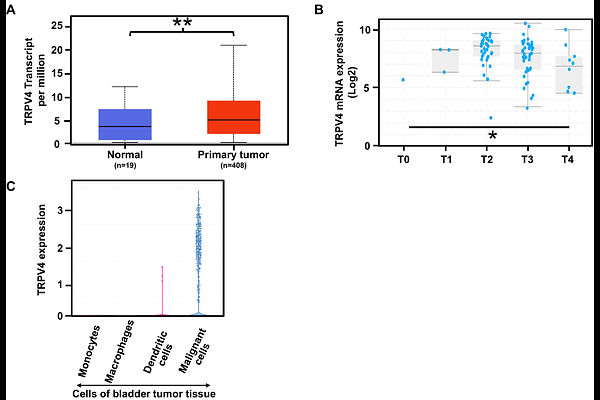TRPV4 Channels Mediate Bladder Cancer Cell Proliferation, Migration and Chemoresistance

TRPV4 Channels Mediate Bladder Cancer Cell Proliferation, Migration and Chemoresistance
Katari, V.; Dalal, K.; Kondapalli, N.; Paruchuri, S.; Nadiminity, N.; Thodeti, C.
AbstractBladder cancer (BLCA) is the second most common urologic cancer in the US and Worldwide which mostly affects the aging population. Despite several ongoing clinical trials, treatment paradigms for BLCA have not changed significantly. Here, we investigated the expression of transient receptor potential vanilloid type 4 (TRPV4) in bladder cancer patients and its role in calcium influx, cell proliferation, and migration using normal human urothelial cells and bladder cancer cells. Analysis of the TCGA database revealed that TRPV4 expression is significantly higher in human bladder cancer tissues compared to adjacent normal tissues. Further, TRPV4 expression was markedly elevated in early-stage bladder cancer and upregulated in muscle-invasive bladder cancer (MIBC) tissues. TRPV4 is expressed in both normal urothelial (SV-HUC-1) and BLCA (T-24) cells and functional assays demonstrated enhanced TRPV4-mediated calcium influx in T-24 cells compared to SV-HUC-1 cells. T-24 cells exhibited greater spreading on extracellular matrix (ECM) gels with increasing stiffness (0.2, 8, and 50 kPa) and exhibited migratory phenotype compared to SV-HUC-1 cells. Pharmacological inhibition of TRPV4 significantly reduced proliferation and migration in T-24 cells but had minimal effects on normal cells. Finally, treatment with cisplatin significantly reduced TRPV4 levels and TRPV4-mediated calcium influx in chemosensitive UM-UC-3 cells, which remained unchanged in chemoresistant T-24 cells, suggesting a potential role of TRPV4 in chemoresistance. In conclusion, TRPV4 may contribute to bladder cancer progression by regulating cell proliferation and migration and may impart resistance to chemotherapy. Targeting TRPV4 could present a novel therapeutic approach for managing bladder cancer progression and overcoming chemoresistance.